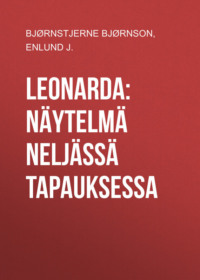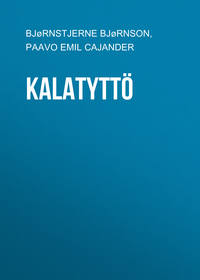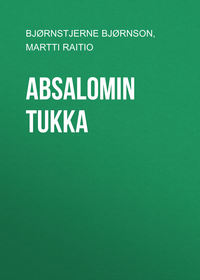 полная версия
полная версияMagnhild; Dust
The long stay in the park, without any out-door wraps and with wet feet, the overstrained mental condition and long night vigils, the pursuit of one fixed idea, without any regard to its effect on herself, being so wholly absorbed in it that she forgot to eat, indeed, no longer felt the need of food – wholly robbed her of strength at last. But the first symptoms of illness were closely united with her restless, ecstatic condition; neither she herself, nor the rest of the household paid any heed to them. When finally she was obliged to go to bed, there still hovered over her such joy, aye, and peace, that the others had no time for anxiety. Her feverish fancies blended in such a way with her life, her wishes, her faith, that it was often not well to separate them. They all understood that she was ill and that she was often delirious, but not that she was in any danger. The physician was one of those who rarely express an opinion; but they all thought that had there been danger he would have spoken. Stina, who had undertaken the supervision of the sick-room, was absorbed in her own fancies and hope, and explained away everything when Atlung showed any uneasiness.
Then one noon he came home from the factories, and after warming himself, went up-stairs to the large chamber where the invalids all lay, for the mother wanted to be where the boys were. Her bed was so placed that she could see them both. Atlung softly entered the room. It was airy and pleasant there, and deep peace reigned. No one besides the invalids, as far as he could see at first, was in the room; but he afterwards discovered that the sick-nurse was there asleep in a large arm-chair, which she had drawn to the corner nearest the stove. He did not wake her; he stood a little while bending over each of the boys, who were either sleeping or lying in a stupor, and thence he stepped very softly to his dear wife's bed, rejoicing in the thought that she too was now peaceful, perhaps sleeping; for he did not hear her babble which usually greeted him. A screen had been placed between the bed and the window, so he could not see distinctly until he came close to her. She lay with wide-open eyes; but tear after tear trickled down from them.
"What is it?" he whispered, startled. In her changed mood he saw at once how worn, how frightfully worn, she was. Why, in all the world, had he not seen this before. Or had he observed it, yet been so far governed by her security that he had not paid any attention to it. For a moment it seemed as if he would swoon away, and only the fear that he might fall across her bed gave him strength to keep up.
As soon as he could he whispered anew, "What is it, Amalie?"
"I see by your looks that you know it yourself," she whispered slowly, in reply; her lips quivered, the tears filled her eyes and rolled down her cheeks: but otherwise she lay quite still. Her hands – oh, how thin they were; the ring was much too large on her finger, and this he remembered having noticed before; but why had he not reflected on what it meant?
Her hands lay stretched out on either side of the body which seemed to him so slender beneath the coverlet and sheet. The lace about her wrists was unrumpled, as though she had not stirred since she was dressed for the morning, and that must now be several hours since.
"Why, Amalie," he burst out, and knelt down at her bedside.
"It was not thus I meant it," replied she, but in so soft a whisper that under other circumstances he could not have heard it.
"What do you mean by 'thus,' Amalie? Oh, try once more to answer me! Amalie!"
He saw that she wanted to reply, but either could not, or else had thought better of it. Tears filled her eyes and trickled down her cheeks, filled her eyes and were shed again, her lips quivered, but as noiselessly as this occurred, just so still she lay. Finally she raised her large eyes to his face. He bowed closer to her to catch the words: "I would not take them from – you," spoken in a whisper as before; the word "you" was uttered by itself, and in the same low tone as the rest, encompassed with a tenderness and a mournfulness which nothing on earth could exceed in strength.
He dared not question further, although he failed to understand his wife. He only comprehended that something had occurred that same forenoon which had turned the current of life to that of death. She lay there paralyzed. Her immobility was that of terror; something extraordinary had weighed her down to this speechless silence, had crushed her. But he also comprehended that behind this noiseless immobility there was an agitation so great that her heart was ready to burst; he knew that there was danger, that his presence increased the danger, that there must be help sought; in other words, he comprehended that if he did not go away himself, his face as it must now look was enough to kill her. He never knew how he got away. He can remember that he was on a stairway, for he recollects seeing a picture that his wife herself must have hung up, it was one representing St. Christopher carrying the child Jesus over a brook. He found himself lying on the sofa in the large sitting-room, with something wet on his brow, and a couple of people at his side, of whom one was Stina. He struggled for a long time as with a bad dream. At the sight of Stina his terror returned. "Stina, how is it with Amalie?" The answer was that she was in a raging fever.
"But what happened this forenoon while I was absent?"
Stina knew nothing. She did not even understand his question. She was not the one who had attended Fru Atlung in the forenoon; she had watched in the night, and then the patient's fever fancies were happy ones, as they had again become. Had the doctor been with her in the forenoon? No, he was expected now. He had said yesterday that to-day he would not come until later than usual. This indicated a feeling of security on the doctor's part.
Had Fru Atlung spoken with any one else? If so it must be the sick-nurse. "Bring her here!" Stina left the room. Atlung also sent away the others who had assembled around him, he needed to collect his thoughts. He sat up, with his head between his hands, and before he knew it he was weeping aloud. He heard his own sobs resounding through the large room and he shuddered. He felt sure; oh, he felt but too sure, that he would sit here alone and hear this wail of misery for weeks. And in this sense of boundless bereavement, her image stood forth distinctly: she came from her bed in her white garment and told him word for word what she had meant. Her prayer to God had been to be allowed to keep her boys, and now this had been granted in a terrible way for she was to have them with her in death. It was this which had paralyzed her. And the beloved one repeated: "I did not mean it thus, I would not take them from – you."
But how had this idea suddenly occurred to her? Why was her security transformed into something so terrible?
The sick-nurse knew nothing. Toward morning the dear lady had fallen into a slumber, and this had gradually become more and more calm. When she awoke rather late in the morning, she lay still a little while before she was waited on. She was excessively weak; the housekeeper helped care for her. Not a word was said to her about her condition, not a single word. She had not spoken herself, except once; it was after she had had a little broth, then she said: "Oh, no, never mind!" She lay back and closed her eyes. Her attendants urged her to take some more; but she made no reply. They stood a little and waited; then they left her in peace.
As the evening wore on, the fever increased; by the doctor's advice she was carried into the next room. She understood this to mean that she was being borne into Paradise, and while they were moving her, she sang in a somewhat hoarse voice. She talked, too, now, without cessation; but with the exception of that hymn about Paradise there was nothing in her words which indicated that she remembered anything that had occupied her thoughts in her moments of consciousness. All was now happiness and laughter once more. Toward morning she slept; but she woke very soon, and at once the unspeakable pain she had had before came over her, but at the same time came also the death-struggle. Amid this she became aware that the beds of the boys were not near hers. She looked at Atlung and opened her hand, as if she would clasp his. He understood that she thought the boys had gone on before and wanted to console him. With this cold little hand in his, and with its gentle pressure through the struggle with the last message from this receding life, he sat until the end came.
But then, too, he gave way wholly to his boundless grief. The responsibility he felt for not having attempted to draw her into his own vigorous reading and thought; for having left her to live a weak dream-life; to bear the burden of the housekeeping and the bringing up of the children, but not in community of spirit and will, partly out of consideration for her, partly from a careless desire to leave her as she was when he took her; for having amused himself with her when it struck his fancy to do so, but not having made an effort to work in the same direction with her, – this was what tormented his mind and could find no consolation, no answer, no forgiveness.
Not until the following night when he was wandering about out of doors, beneath a bright starlit sky, came the first soothing thoughts. Would she under any circumstances have forsaken the ideas of her childhood to follow his? Were not they an inheritance, so deeply rooted in her nature that an attempt to alter them would only have made her unhappy? This he had always believed, and it was this which ultimately determined him to live his life while she lived hers. The image of his beautiful darling hovered about him, and the two boys always accompanied her. Whether it was because of his own weariness, or whether his self-reproaches had exhausted themselves and let things speak their own natural language – his guilt toward her and toward them was shifted slightly and spread over many other matters, which were painful enough; but not as these were.
What these matters were, he did not tell me; but he looked ten years older than before.
The doctor sought an interview with him the next day, and said that he felt obliged to tell him that if he had not pronounced his wife's condition dangerous it was because he had felt sure that she would recover. Her own happy frame of mind would help her, he thought. But something most have happened that forenoon.
Atlung made no reply. The doctor then added that the boys were past all danger; the elder one, indeed, had never been in any.
Atlung had not yet for a moment separated mother and boys in his thoughts. During their illness he felt with her that they must live; for the last twenty-four hours he had been convinced that they must follow her in death. He could not think of the mother without them.
And now that he must separate them, the first feeling was – not one of joy: no, it was dismay that even in this matter the dear one had been disappointed! It seemed as though she were living and could see that it was all a mistake, and that this last mistake had needlessly killed her.
The two little boys, clad in mourning, were the first objects we met on the gard. They looked pale and frightened. They did not come to meet us, nor did they return their father's caress.
In the passage Stina met us; she too looked worn. I expressed my honest sympathy for her. She answered calmly that God's ways were inscrutable. He alone knew what was for our good.
Atlung took me with him to the family burial-place, a little stone chapel in a grove near the river. On the way there, he told me that every time he tried to talk confidentially with the boys and endeavor to be both father and mother to them, his loss rushed over him so overwhelmingly that he was forced to stop. He would learn with time to do his duty.
The sepulchral chamber was a friendly little chapel, in which the coffins stood on the floor. The door, however, was not an ordinary door, but an iron grating which now stood open; for there was work going on in the chapel. We removed our hats, and walked forward to her little coffin. We did not exchange a word. Not until after we had left it and were looking at the other coffins and their inscriptions, did Atlung inform me that his wife's coffin was to be placed in one of stone. I remarked that in this way we would eventually have more of our ancestors preserved than would be good for us. "But there is reverence in it," he replied, as we walked out.
There was warmth in the atmosphere. Over the bluish snow, the forest rose green or dark gray and the fjord was defiantly fresh. Spring was in the air, although we were still in the midst of winter.
1
The first edition of Björnson's writings, from which the present edition is arranged, was in seven volumes. "Magnhild" formed the seventh volume, and the present preface is reprinted as it there stood.
2
Conveyance.
3
Keats.
4
Fru corresponds to the German Frau, and means Mrs. – Translator.









